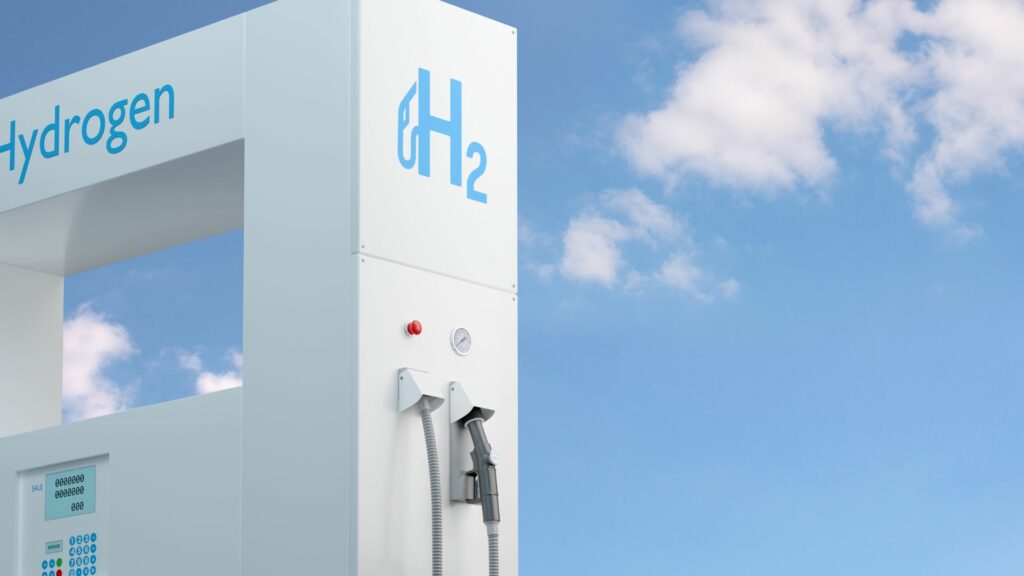How much does hydrogen cost to fuel an FCEV fuel cell powered car or truck? As the world moves towards cleaner energy solutions, hydrogen fuel emerges as a pivotal player in the heavy transportation sector. With its potential to revolutionize the industry, understanding the retail pricing of hydrogen across different regions is crucial for transportation managers.
Hydrogen vs. Traditional Fuels: How Much Does Hydrogen Cost by Country?
When comparing hydrogen to traditional fuels like diesel and gasoline, it’s crucial to consider a multitude of factors beyond the cost per unit. Hydrogen fuel cells boast a higher energy conversion efficiency, typically around 60%, compared to internal combustion engines at 20-30%. This superior efficiency means that hydrogen vehicles can travel further on the same amount of energy, which is a significant advantage for heavy transportation where range and fuel efficiency are paramount.
The cost of gaseous 700 bar hydrogen can vary significantly depending on the region due to differences in production methods, infrastructure, and local market conditions. Here’s a brief overview of the costs in the countries mentioned:
- How much does hydrogen cost in China?: The cost of hydrogen in China is influenced by the method of production with electrolysis-based sources (renewable energy) costing more than traditional methods like coal gasification. The price generally ranges from less than 2 EUR/kg to more than 10 EUR/kg depending on the production scale and technology used.
- In China, the cost of hydrogen for FCEV heavy transportation trucks is currently between ¥40 to ¥70 per kilogram (approximately $6 to $11 USD per kg). This pricing is still relatively high compared to conventional diesel, but significant reductions are expected. By 2025, the cost of green hydrogen is anticipated to decrease to below ¥30 per kg (around $4.69 USD per kg), making hydrogen fuel competitively priced against traditional petroleum fuels. Further cost reductions are expected by 2030, aligning the purchasing prices of hydrogen-powered Fuel Cell Electric Vehicles (FCEVs) more closely with those of petroleum-fueled vehicles, thereby enhancing their market competitiveness (SPGlobal).
This forecast is part of broader initiatives within China to expand its hydrogen infrastructure and lower production costs, which include increasing the installed capacity of electrolysers used to produce hydrogen (IEA). These efforts are aimed at making hydrogen a more viable and sustainable alternative to fossil fuels across various sectors, including heavy transportation.
- In China, the cost of hydrogen for FCEV heavy transportation trucks is currently between ¥40 to ¥70 per kilogram (approximately $6 to $11 USD per kg). This pricing is still relatively high compared to conventional diesel, but significant reductions are expected. By 2025, the cost of green hydrogen is anticipated to decrease to below ¥30 per kg (around $4.69 USD per kg), making hydrogen fuel competitively priced against traditional petroleum fuels. Further cost reductions are expected by 2030, aligning the purchasing prices of hydrogen-powered Fuel Cell Electric Vehicles (FCEVs) more closely with those of petroleum-fueled vehicles, thereby enhancing their market competitiveness (SPGlobal).
- How much does hydrogen cost in USA and Canada?: In North America, the price of hydrogen also varies widely, typically around $11/kg at smaller production scales with projections of reducing to about $8/kg as station capacities increase.
- In California, the retail prices for green hydrogen have reached around $30/kg in 2023, reflecting both the state’s leadership in environmental initiatives and the higher costs associated with early adoption and production of green hydrogen (TopElectricSUV).
- How much does hydrogen cost in Australia?: The cost of hydrogen in Australia follows similar patterns to the U.S. and Canada, subject to infrastructure and technology improvements which might reduce costs over time.
- In Australia, the cost of hydrogen fuel for FCEV heavy transportation trucks is currently in the range of AU$4-6 per kilogram (approximately US$2.76-4.14). This cost is expected to decrease significantly over the next few years as green hydrogen production scales up with advancements in technology and an increase in renewable energy capacity. By 2030, the production cost is projected to drop to around AU$2-2.8 per kilogram, depending on the advancements in electrolyzer technologies and the reduction in renewable energy costs (Infolink Group).
This pricing is part of Australia’s broader strategy to become a leader in green hydrogen, with several initiatives aimed at increasing the use and production of hydrogen as a clean energy source (IEEE Spectrum). Additionally, companies like Pure Hydrogen are actively promoting hydrogen fuel cell trucks like the Taurus model, which are designed for heavy-duty applications and have a refueling time of just 15 minutes, offering a range of over 600 km (Stockhead).
- In Australia, the cost of hydrogen fuel for FCEV heavy transportation trucks is currently in the range of AU$4-6 per kilogram (approximately US$2.76-4.14). This cost is expected to decrease significantly over the next few years as green hydrogen production scales up with advancements in technology and an increase in renewable energy capacity. By 2030, the production cost is projected to drop to around AU$2-2.8 per kilogram, depending on the advancements in electrolyzer technologies and the reduction in renewable energy costs (Infolink Group).
- How much does hydrogen cost in Spain, Germany, and France?: In Europe, the cost of hydrogen is quite diverse but generally high, reflecting the extensive use of renewable energies for hydrogen production. The cost in these countries generally falls within a range of less than 1 EUR/kg to over 10 EUR/kg, depending on the specific region and its infrastructure.
- In Spain, the current price for hydrogen fuel used in FCEV heavy transportation trucks is around €7-€8 per kilogram as of early 2023. These costs reflect the prices at wholesale power markets and are subject to fluctuations based on energy market conditions and renewable power generation outputs (ICIS Explore)
Looking towards the future, there is a target to reduce hydrogen fuel prices to about €4 per kilogram by 2030 to achieve cost parity with diesel for long-haul trucks, assuming adequate subsidies and regulatory support are in place to bridge the price gap (ICCT).
These figures highlight the ongoing effort within the European hydrogen market, including Spain, to make hydrogen a competitive and sustainable alternative for heavy transportation, aligning with broader environmental goals and the push for renewable energy sources (European Hydrogen Observatory). - In Germany, the cost of hydrogen for FCEV heavy transportation trucks is currently around €7-€8 per kilogram as of early 2023. Prices have seen fluctuations influenced by various market factors, including energy costs and production methods (H2.LIVE) (ICCT).
Looking towards the future, there are expectations that hydrogen fuel costs will need to reduce significantly to compete effectively with diesel. Studies suggest that achieving a hydrogen price of around €4 per kilogram by 2030 could align the total cost of ownership for hydrogen fuel cell trucks with that of diesel trucks, provided that sufficient subsidies and infrastructural developments are in place (ICCT). - In France, as of early 2023, the cost of hydrogen for FCEV heavy transportation trucks is approximately €7-€8 per kilogram. This price is based on the wholesale power market’s electrolysis costs, which have seen a decrease due to mild weather conditions and a good supply of renewable energy (ICIS Explore).
Looking ahead, there’s a broader goal in Europe, including France, to reduce hydrogen fuel prices to around €4 per kilogram by 2030 to make it competitive with diesel. Achieving this price reduction will likely require ongoing subsidies and further development of hydrogen infrastructure (ICCT).
- In Spain, the current price for hydrogen fuel used in FCEV heavy transportation trucks is around €7-€8 per kilogram as of early 2023. These costs reflect the prices at wholesale power markets and are subject to fluctuations based on energy market conditions and renewable power generation outputs (ICIS Explore)
How Much does Hydrogen Cost and What Contributes to its Price?
It’s important to note that hydrogen prices are highly sensitive to local economic conditions, government subsidies, and technological advancements. Therefore, prices can fluctuate and might differ based on specific market and geopolitical dynamics at any given time.
Furthermore, the environmental impact of hydrogen is markedly lower. While traditional fuels emit pollutants such as CO2, NOx, and particulate matter, hydrogen fuel cells emit only water vapor. This stark contrast positions hydrogen as a leading sustainable alternative that aligns with global carbon reduction goals. Additionally, when hydrogen is produced via green methods—such as electrolysis using renewable energy sources—the overall environmental benefits are even more pronounced.
However, the current cost of hydrogen fuel is a barrier to its widespread adoption. The production, storage, and distribution of hydrogen are still more expensive than traditional fuels, although prices are expected to decrease with technological advancements and increased scale. For transportation managers, the long-term cost savings from reduced maintenance and the potential for government incentives aimed at reducing emissions make hydrogen an increasingly attractive option for heavy transportation fleets.





